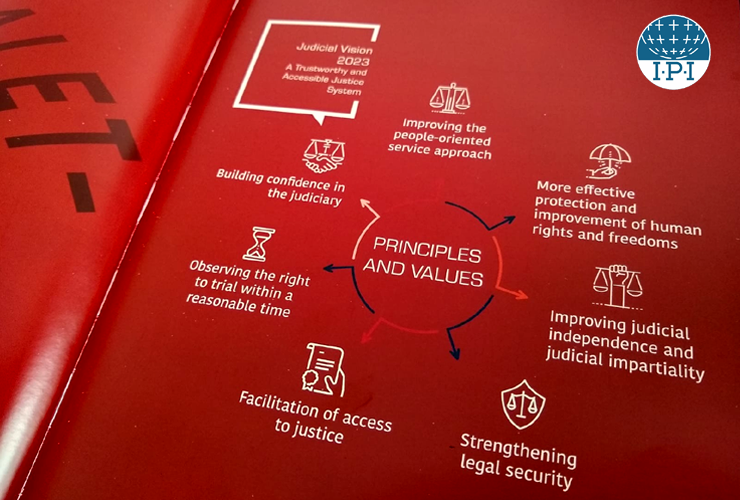Proposed legislative changes due to be presented today in Turkey’s Parliament as part of a long-awaited Judicial Reform Strategy (JRS) are inadequate to protect journalists’ rights, the International Press Institute (IPI) said today.
The initial package, first shared by the Justice Ministry with political parties on September 23, proposes changes to 38 articles regarding 15 laws, including legislation covering judges and prosecutors, anti-terror laws and the penal and criminal codes.
Turkish officials have said the Judicial Reform Strategy, officially launched by President Recep Tayyip Erdoğan on May 30, 2019, will deliver changes in the prosecution of journalists and press freedom cases by increasing judicial independence, adding safeguards to protect basic rights and improving administrative and judicial procedures in courtrooms. That same message was delivered to an IPI-led international mission to Turkey in early September.
An IPI review of the package, however, shows that while the proposals make some minor changes to the legislation and functioning of the judiciary, they ignore the substantial overhaul required for it to recover from the impact of the State of Emergency and to come into line with international standards of judicial independence and respect for freedom of expression.
The changes introduced include:
Anti-terrorism law: The current legislation has been heavily criticised for its vague wording and lack of clarity, allowing courts to prosecute journalists for propaganda or membership of a terror organization just on the basis of their journalism. In response, the draft legislation has added the following amendment to Article 7 paragraph 2 regulating the crime of spreading terrorist propaganda [via the press]:
“content which does not cross the line of reporting and opinion pieces with the purpose of criticism do not constitute a crime”.
However, the changes still do not define “terrorist propaganda” nor do they define “line of reporting” or refer to international standards, leaving these terms open to abuse and arbitrary restriction, which has been a key feature of the ongoing media crackdown and led to the arrests of hundreds of journalists.
Right to appeal: Previously, defendants who received jail sentences of less than five years had no right of appeal to Turkey’s Supreme Court of Cassation while defendants sentenced to more than five years could appeal. This discrepancy resulted in many journalists with shorter sentences being denied the right to appeal and serving the remainder of their sentences in jail, as in the trial of journalists with the secular newspaper Cumhuriyet. The judicial reform package would lift that limitation for certain types of cases, including defamation and terrorist propaganda, both of which commonly feature in journalist cases.
While IPI welcomes this move it regrets that the reform package has not gone further to strengthen the application of precedent based on rulings of the Constitutional Court made in line with European Court of Human Rights (ECtHR) jurisprudence so that journalists are not charged, detained, prosecuted and imprisoned based on politically motivated or arbitrary application of the law in the first place.
Pre-trial detention: One of the most damaging features of Turkey’s press freedom crisis has been the arbitrary pre-trial arrest and detention of journalists, who are often held for months, and sometimes years before their cases come to court. The ECtHR has consistently condemned such detention as a “real and effective constraint” on freedom of expression that leads to self-censorship and can only be justified in cases of hate speech or incitement to violence. Moreover, this position has been backed by Turkey’s Constitutional Court in its own rulings against pre-trial detention. Despite these rulings, prosecutors continue to request, and lower courts continue to uphold, the detention of journalists without justification.
The draft legislation regarding penal procedure law proposes setting specific time limits for pre-trial detention for different types of crimes as follows:
- Cases under the lower criminal courts: maximum pre-trial detention of six months
- Cases under high criminal courts: maximum detention one year
- Anti-terror legislation: up to one-and-a-half years and extendable for another six months.
This reform, however, will do little to improve the situation of journalists, who are targeted most often precisely under anti-terror laws. Indeed, this looks like a step backwards as it legislates a practice that has been criticized in the Constitutional Court’s recent rulings. Moreover, it fails to stop prosecutors bringing the most serious charges, without supporting evidence, in order to maximize the length of detention.
IPI believes that the problem is best addressed by improving the definition and scope of terrorism offenses and identifying a clear threshold of evidence before charges are brought and journalists arrested.
Judicial independence: The judiciary has been severely compromised in the past three years with the dismissal and arrests of over 3.000 judges due to alleged support of the movement led by exiled Islamic preacher Fethullah Gülen and the introduction of direct appointment of the Council of Judges and Prosecutors (HSK) by the president and parliament as part of a 2017 constitutional change. This system enables the government to effectively handpick the judicial governing body that oversees the work, selection, promotion and disciplining of judges.
The JRS has unfortunately ignored this key issue. Justice Ministry officials had informed the IPI-led delegation that the reforms would at least include changes to protect judges and prosecutors from being relocated during proceedings and strengthen objective criteria for career advancement. However, even these tentative efforts to improve the independence of judges have been ignored in the current proposals.
Online censorship: Presented as one of the remedial reforms in the package, following bans on scores of news websites and information portals, including Wikipedia, the draft amendment proposes that when online content is subjected to a ban, the restriction of access will be limited to the specific webpage URL containing the offending content only, allowing the rest of the website to operate normally. However, the article goes on to say that where this limited measure fails to prevent the alleged crime, the ban can be expanded to the whole website. Yet again, this exception clause introduces a back door for continued arbitrary censorship of Turkey’s news sites.
Fails to address fundamental obstacles
IPI led a delegation of eight press freedom organizations to Turkey September 11 to 13 where it welcomed the opportunity to engage with the justice ministry in the judicial reform package. The proposals announced fall far short of what is needed.
A full overview of the reform needs can be found in the mission’s conclusions and in the joint submission made in July as part of the U.N.’s Universal Periodic Review of Turkey.
In addition to the points above, the initial reform package fails to address major violations of the right to a fair trial uncovered by IPI’s trial monitoring programme with the Media and Law Studies Association. It also does not address the problems in the extension of the audiovisual regulator’s mandate into the licensing of undefined online broadcasters or the reform of the accreditation of journalists, which is used to deny journalists access to press credentials.
“Our meetings with Turkey’s highest courts and Ministry of Justice in September largely confirmed our concerns over the endemic weaknesses of the judicial system, a recognition to admit some of the problems but a refusal to address the substantial issues that need to be tackled,” Oliver Money-Kyrle, IPI Turkey programme manager, said following the joint mission to Turkey.
“Unfortunately this reform package does little to address the fundamental obstacles to creating an independent, effective judiciary that protects fundamental rights of free expression and delivers justice to the people.”




